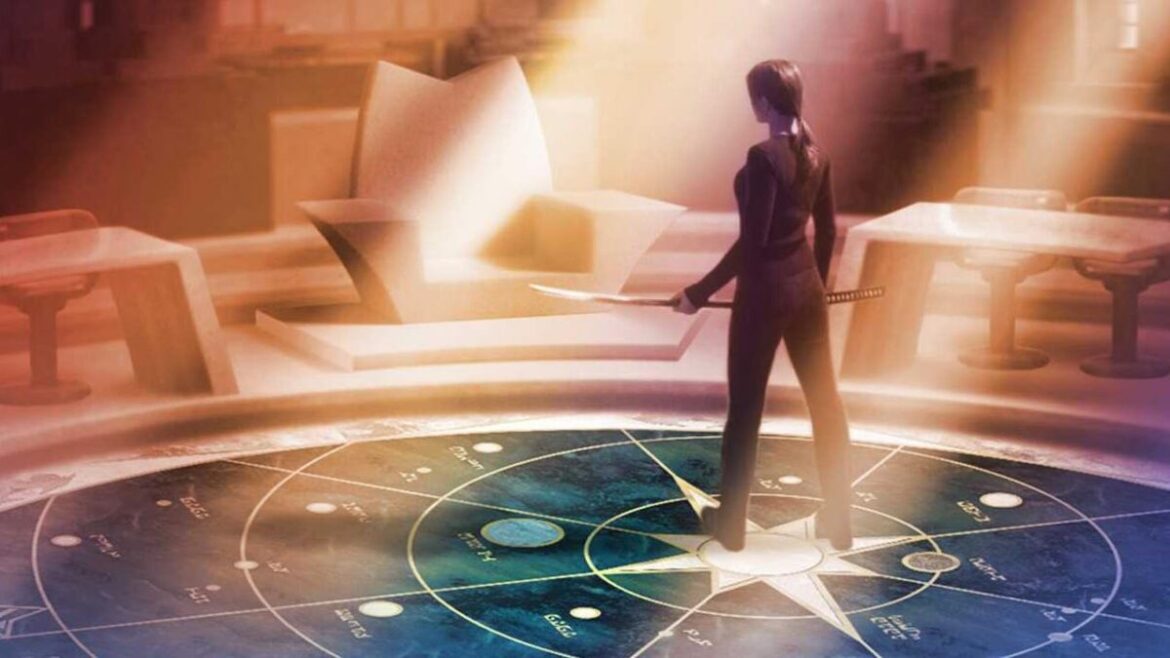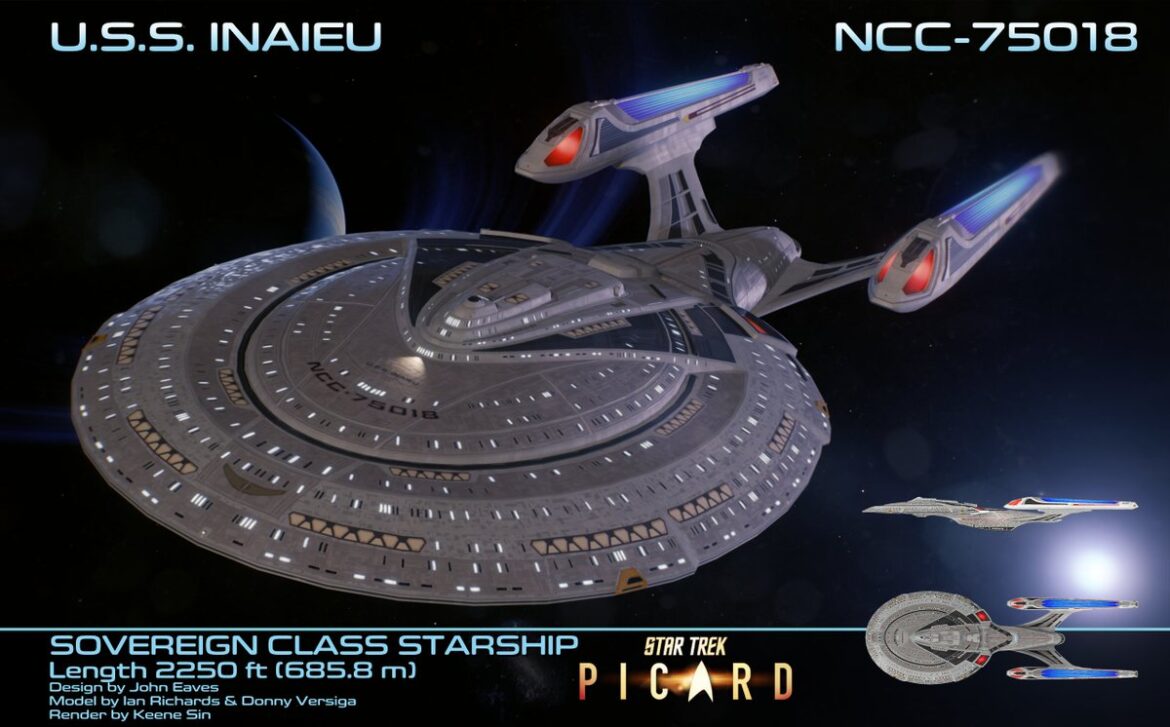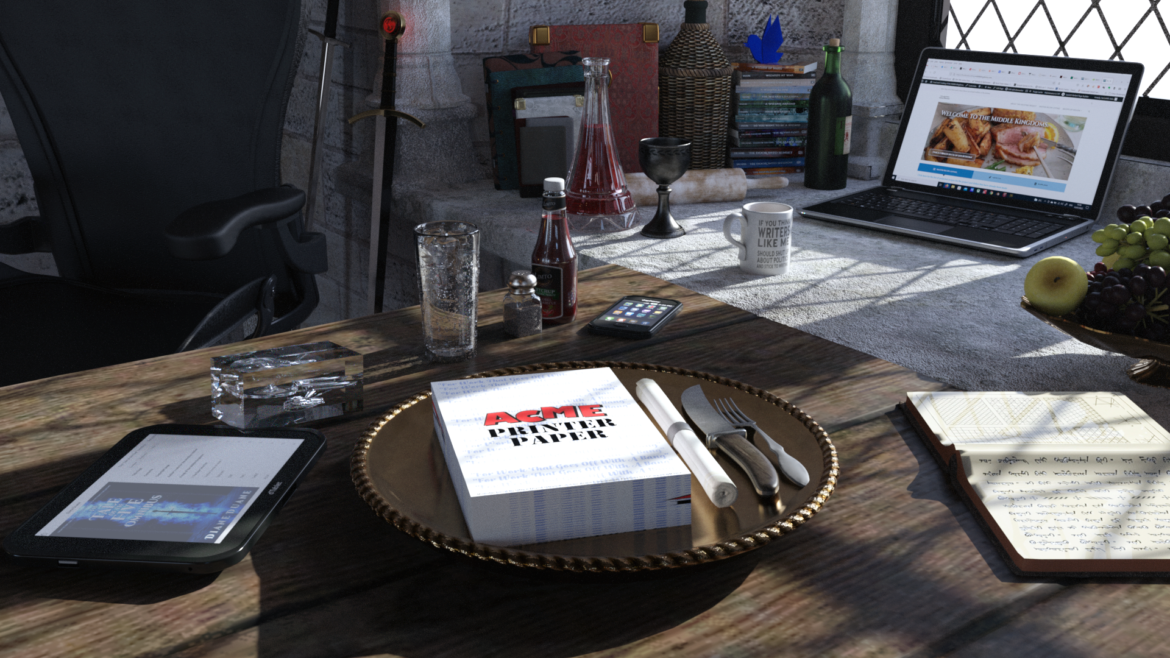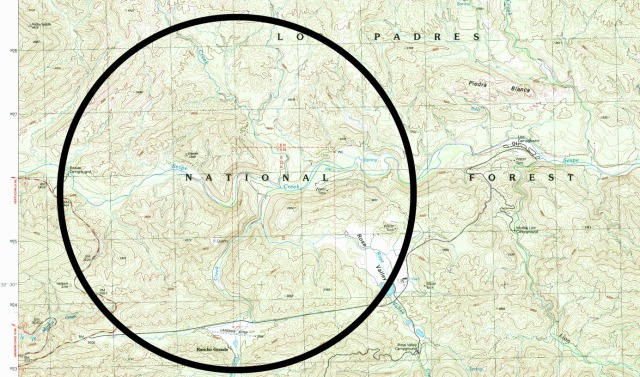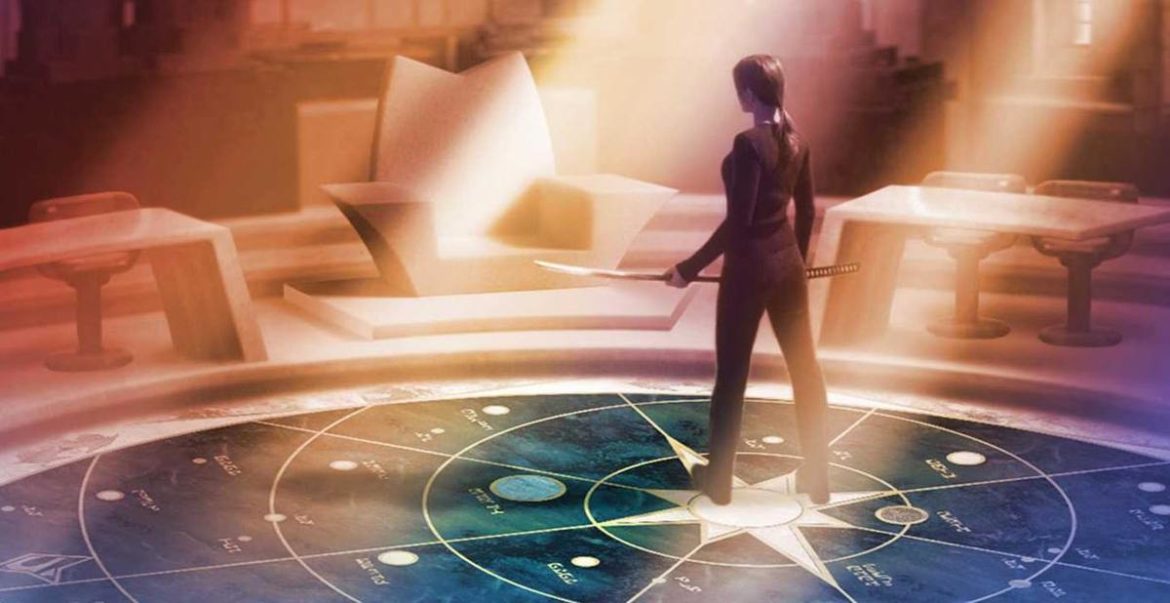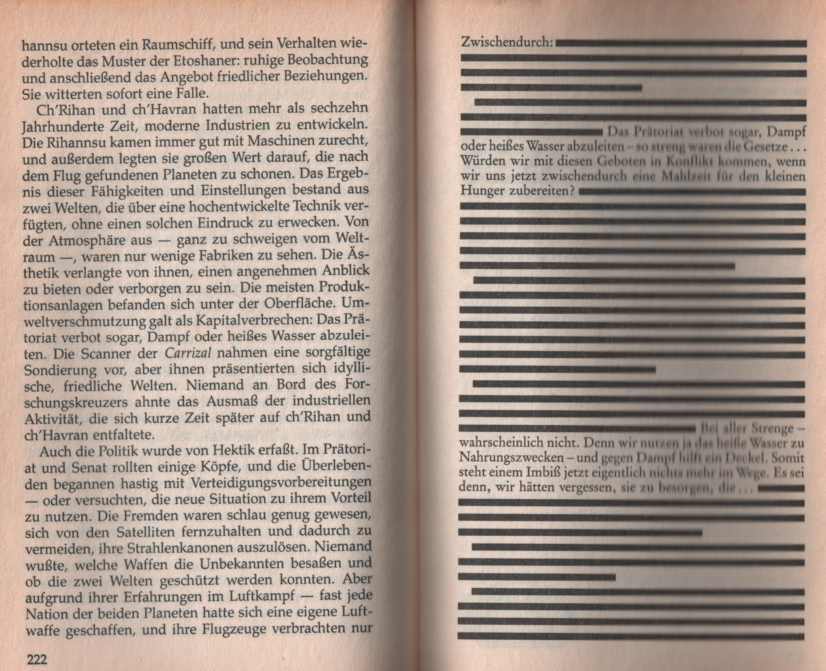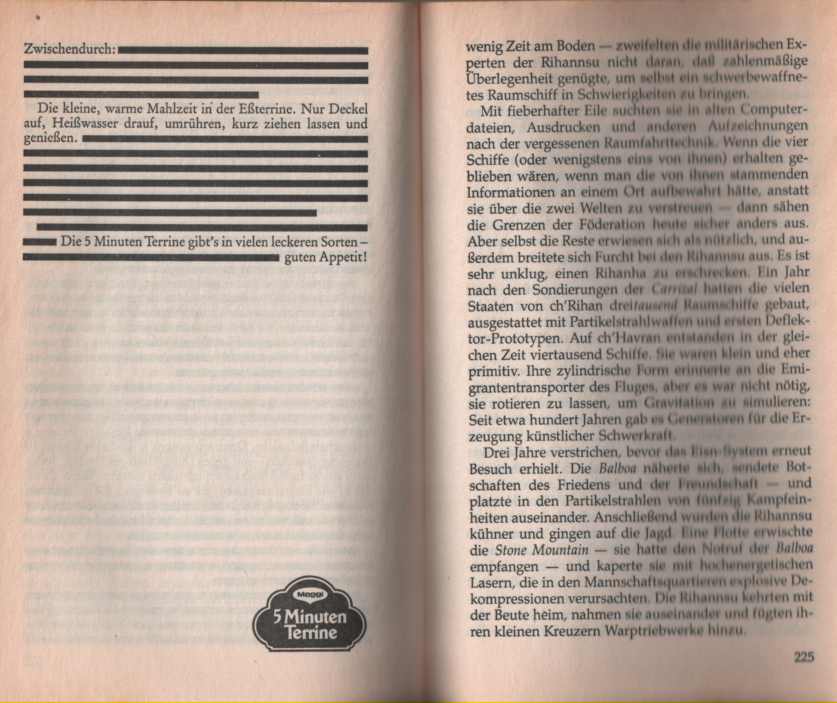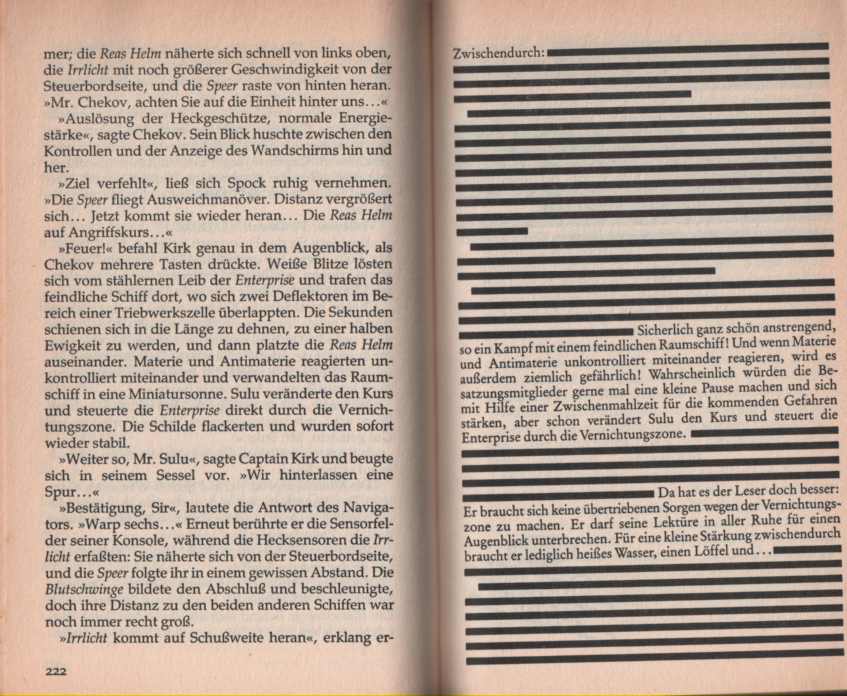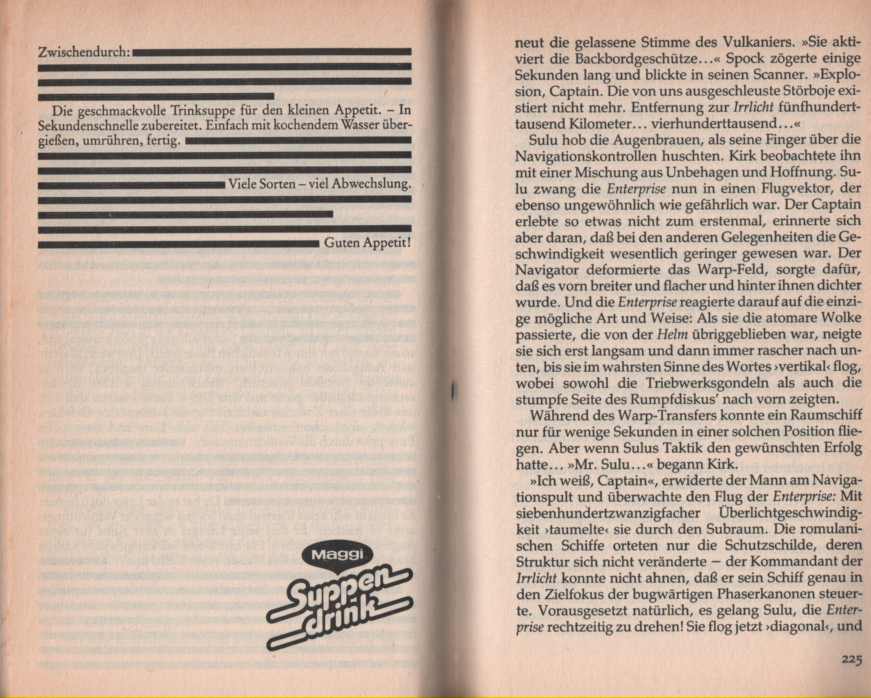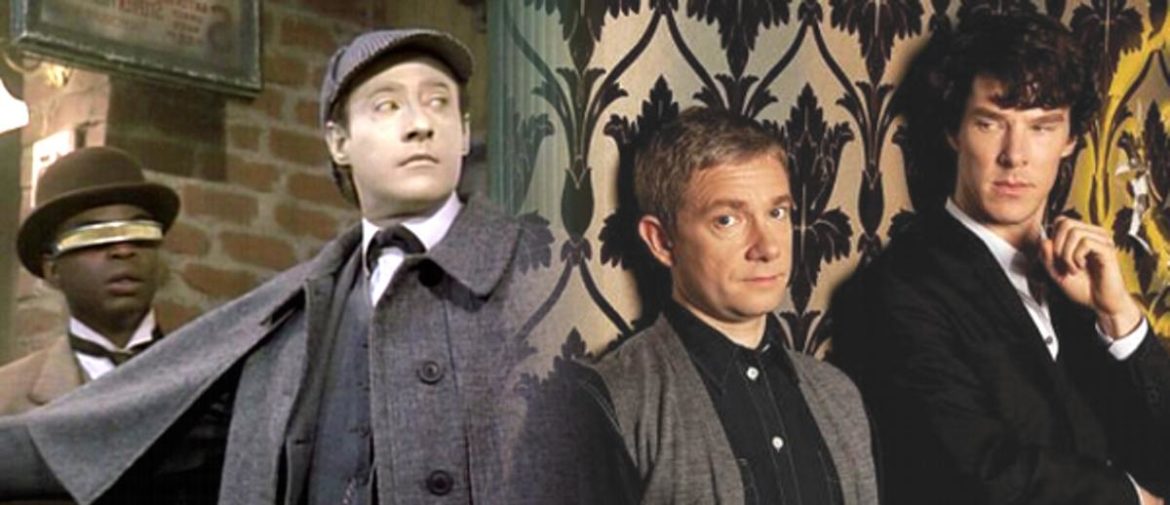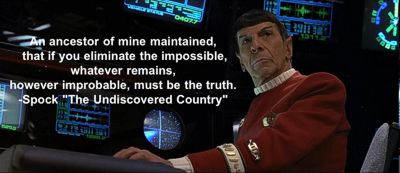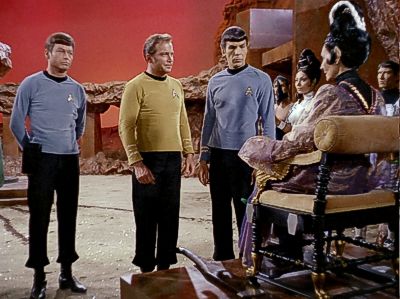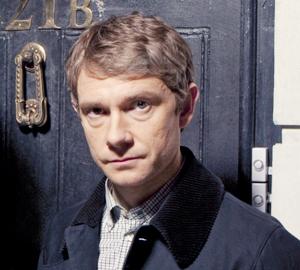A quick note about this entry:
The material below initially appeared in my very first blog (hand-coded, every page of it…), “Homeward”, at our old owlsprings.com site. That domain—originally sited at the servers that came to house IMDb.com—was abandoned over time, after all the blogs and pages associated with it were combined and moved to their own new domains, or split out into other newer blogs (like this one).
Over time, though, apparently sites interested in acquiring content without the owner’s permission scraped the contents of “Homeward” and my other blogs. So when this nice poster at Tumblr brought up my creation of the Rihannsu recension of the Romulan language, and I went looking for the article I’d written about it and the programs I’d devised to generate Rihannsu words, imagine my annoyance to discover that the only place online the article could be found was Scribd… all festooned with vast numbers of ads, and nearly unreadable. (Or you could pay them virtual blackmail to read it. “Upload five text articles and read this one free! Or look at some ads instead.”)
I… did not sign up for that kind of thing. I originally put the article up for anybody interested to look at for free. So here it is! (And if you want to look at one of my ads, go for it. But I’m not going to hold the content hostage while you do it, ffs.)
Dug up out of my hard drive—because when text files take up so little space, why ever throw writing away?—is the text of my original 1996 post from “Homeward”. Some more recent alterations or additions appear in [brackets]. At the bottom I also add links to the text [or PDF’d] files that contain the (adorably primitive) BASIC programs I built. I’ve also added, via the Wayback Machine, links to those programs’ online CGI versions, which will still produce Rihannsu text for you every time their pages load. (The basic BASIC program has also been ported to C[++?] over time: that link’s down at the bottom, too.)
And now, the article.
***
It should probably be said right at the start that I am not really to be considered any kind of expert on Romulan matters. The final word in such cases always lies with the people who are writing Trek for TV and movies: Trek novels are considered “noncanonical”, not really part of the Trek canon. The real experts on Romulan life remain Gene Roddenberry (God rest him) and D.C. Fontana [ditto], who did the initial work on the race in the original Trek series, and the present writers of Deep Space Nine and the movies.
Now, as to how the novel got started, by way of background: Originally—this was a little while after the first edition of the Klingon Dictionary had come out—I asked my editor at Pocket (Dave Stern, it was then) whether I might do a Romulan dictionary. Dave told me, somewhat to my disappointment, that the dictionaries weren’t selling very well at that point (this was before the present resurgence of interest in the Klingon language, which [hilariously] is now spoken by more people on Earth than Esperanto). Instead, though, Dave said, would I like to do a Romulan novel?…
The idea was interesting enough. I liked the Romulans, always had, and the thought of doing a book about their culture attracted me. Could I just make up the culture, then? I asked Pocket. Yes, they said, I could.
So I got on with it.
Language came up for consideration fairly early, because I like languages. Though I’m fluent only in English, I read Latin well, and German fairly well, and Romansch slightly, and classical [Aeolian] Greek haltingly, and I have a nodding acquaintance with about twelve other languages. (This means I know in a general way how their grammars and syntaxes work, and how their sentences are put together. It also means I know how to say please and thank you and good morning and good night, how to ask where the ladies’ room is, how to ask for another drink, the same as last time, and how to point at things in stores and ask for one of those, please: that kind of thing.) It seemed impossible to write much about the culture without doing at least a little work on the language.
Now, I had just finished working out a language for an alien species in one of my fantasy novels (the Dracon language, in The Door Into Shadow), and was pretty much “linguistically pooped” when it was time to start work on the Romulans. But at the same time, something had to be done for them…so I sighed and got on with it.
The first thing to do was to decide what the language should sound like. It seemed inevitable that it should sound slightly Latinate, since there had always been a slightly Roman cast to the Romulans we saw in the original series. At the same time, a language’s evolution also has to reflect its people’s history: and harking back to the Romulan Commander’s reference to the Vulcans as “our ancient brothers”, it seemed likely to me that Romulan would have at least some grammatical likenesses to Vulcan.
Well, we knew, and know, very little (in the canonical sense) about Vulcan grammar. But what about the sound of the language? If the Romulans were (as I increasingly began to suspect during the writing of Enemy/Ally) an offshoot of the Vulcan culture who might equally have been thrown out, or might have left it on purpose, would they necessarily sound that much like the Vulcans any more? Mightn’t it be possible that they had extensively retooled their own language to emphasize the difference between them and their parent stock? (The history of the Pravic language, in Ursula K. LeGuin’s The Dispossessed, probably gave me this idea.) And if there’s anything we know about the Vulcan language [from ST:TOS], it’s its harshness: full of fricatives and other sharp sounds.
So there at least was a hint. I wanted the Latinate sound, all right, but also intended to suggest that the Romulans / Rihannsu-to-be had purposely gone for a more melodious-sounding language, as a reaction against the hard sounds of Vulcan. So I thought that the language should be strong on liquid combinations and soft diphthongs. Welsh suggested itself to me as an example, right away: so did some of the vocalic aspects of Greek. I started coining some words to get the feel of it, and produced a few pages’ worth.
At this point, I ran across one of my problems with inventing languages. Not grammar—exotic grammars are easy to build. And if you can’t build, you can always steal. Real languages are often much crazier and less logical than anything one would normally invent: look at Irish, or Maltese, for good examples of this. (Indeed, Mark Okrand doesn’t appear to have hesitated in this regard: Klingon orthography looks a whole lot, to me, like some of the orthographies used to write various Native American dialects in the early part of this century.) My problem was that, when coining “alien” words, I tend to get in a rut: they start sounding alike. I don’t know if other writers have this problem. I just knew I was going to have to find a way around it.
And, lazy creature that I am, I found it. One of the other languages I have a nodding acquaintance with is BASIC. I am not a great programmer—I have too many other calls on my time to become really elegant at it—and Heaven knows that BASIC has been bypassed by other languages far more sophisticated. However, it suited my needs. Having decided what kinds of sounds I wanted to appear in Romulan, and how frequently they might appear, and having decided what combinations looked ugly and should be “impossible”, I then spent a week or so writing a quick-and-dirty BASIC program which would take numerous consonantal and vocalic “building blocks” I had chosen, and combine them to create words that would avoid my own “ruts” or repetitive tendencies in word-coining. The program would produce several thousand words of Rihannsu in a given run, in a format that looked kind of like blank verse.
Once it was running, I must have gone through about half a ream of paper this way, generating words, and then going through the output and choosing the words I best liked. Ael’s name came up in one such run [with due consideration of the inevitable pun]. To that word, and others, I assigned meanings as I wrote the novel. And that was all the work I did on the language, except (when Peter and I sat down [during our honeymoon!] to write The Romulan Way) to collect all the words together into a glossary, which appears at RomWay‘s end.
Nowadays it seems unusual for a week to go by in which I don’t get a request for Romulan language information. I don’t have any more, alas, except what you see above, and what’s in the books. But I have no problems with passing my tools along to those who feel like using them.
So, for those who might be interested, I hereby bequeath you enthusiasts (check the links below) the “produce screen print” version of the Rihannsu “language generator.” Its first version was written in the form of BASIC that ran on my first computer, an Osborne. (This is the faithful machine that appears with me in the picture in The Faces of Science Fiction: those with a good magnifying glass might just be able to make out, on the tiny screen, that it’s Enemy/Ally which was being worked on at the time.) Later the program was rewritten slightly, when I moved to a PC, so that it would run in GW-Basic. Having just tested it, I find that it runs happily enough in Microsoft QBASIC as well.
The only thing I’ll ask regarding the program is that, should anyone produce a better version of it, that they please send me a copy, with the code, for my files.
You all have my permission to give copies of this program to whoever you like. Note also that it works well for other invented languages: just edit the data statements to contain different combinations of sounds. (While preparing to write The Door Into Sunset, I plugged the Dracon language “building blocks” into the program and saved myself some time.)
How to run them:
Load the text of the program file into your BASIC program. It will ask you for a carriage return: this provides a value to the random number generator. It will then ask you for a number seed. Give it a number within the specified range, and hit the carriage return again. A screenful of Rihannsu will spill out. (In the print version, especially if you’re using a laser printer, you may have to give it several seeds one after another before a page will print.)
Continue until you’ve got enough output to make you happy. Control-C should break out of the program (though if I remember right, the program will break [down…] itself after a while, either because of a divide-by error, or because of some other more picturesque error committed by the programmer). I leave it to some other, more skilled programmer, to tinker one or another version of the program into one that produces both screen and print output. I’ve got my hands full with another TNG novel at the moment, and am wrestling with other linguistic problems (such as working out what French swearwords are hot enough to adequately reflect Picard’s feelings without causing the publisher to have a coronary).
At any rate, I hope you have fun with the program.
— Diane Duane
January 6, 1996
***
Addendum: January 28, 1996
Since I posted the material above, other people have begun tinkering with the program and spreading it around in other nice ways. For those who might be interested, I include here a link [via the Wayback Machine] to the online, cgi-bin version of the program written by Joel Polowin. [And it continues to work just fine.] Thanks [again], Joel!
Here, too [as a PDF, because for some reason my media file is objecting to the .txt format), is a “C” port of the program, courtesy of Curt Snyder of “Hot’s Delight” Hot Sauces and Spicy Foods, at hotsdesr@deltanet.com. My thanks to yet another stalwart Chile-Head!
For the benefit of those of you who’re doing other kinds of tinkering, I add this note from Curt’s note to me: “FYI, I found an error in your romulan basic code (small one), lines 4310 through 4370 reference variable ARGH23% when they should be using ARGH22%.” And he goes on to say:
“The following is the C port I did. Feel free to post on your page. You may copyright it with YOUR name, as the original code was yours.”

